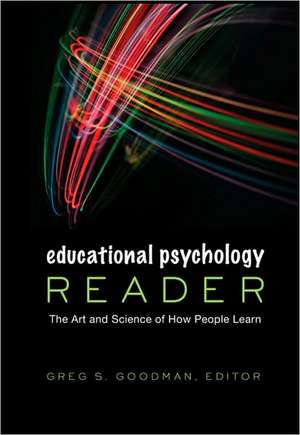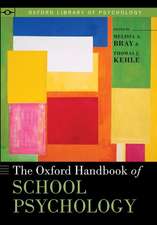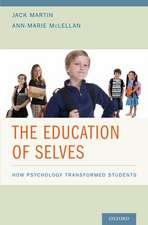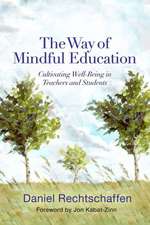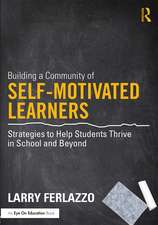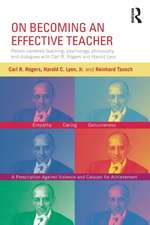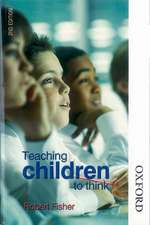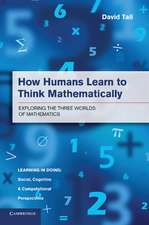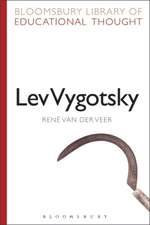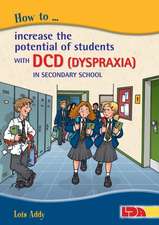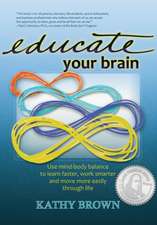Educational Psychology Reader: Educational Psychology
Editat de Greg S. Goodmanen Limba Engleză Hardback – 29 apr 2010
| Toate formatele și edițiile | Preț | Express |
|---|---|---|
| Paperback (1) | 534.48 lei 43-57 zile | |
| Peter Lang Gmbh, Internationaler Verlag Der W – 4 dec 2013 | 534.48 lei 43-57 zile | |
| Hardback (1) | 1186.14 lei 38-44 zile | |
| Peter Lang Gmbh, Internationaler Verlag Der W – 29 apr 2010 | 1186.14 lei 38-44 zile |
Din seria Educational Psychology
- 23%
 Preț: 442.14 lei
Preț: 442.14 lei - 27%
 Preț: 752.89 lei
Preț: 752.89 lei - 23%
 Preț: 444.07 lei
Preț: 444.07 lei - 23%
 Preț: 804.21 lei
Preț: 804.21 lei -
 Preț: 370.17 lei
Preț: 370.17 lei - 27%
 Preț: 1268.61 lei
Preț: 1268.61 lei - 27%
 Preț: 938.26 lei
Preț: 938.26 lei - 27%
 Preț: 943.76 lei
Preț: 943.76 lei - 9%
 Preț: 850.86 lei
Preț: 850.86 lei - 9%
 Preț: 738.24 lei
Preț: 738.24 lei - 27%
 Preț: 947.97 lei
Preț: 947.97 lei - 23%
 Preț: 440.33 lei
Preț: 440.33 lei -
 Preț: 443.35 lei
Preț: 443.35 lei - 23%
 Preț: 452.05 lei
Preț: 452.05 lei - 27%
 Preț: 1074.02 lei
Preț: 1074.02 lei - 23%
 Preț: 677.01 lei
Preț: 677.01 lei - 23%
 Preț: 582.35 lei
Preț: 582.35 lei - 18%
 Preț: 473.88 lei
Preț: 473.88 lei - 23%
 Preț: 482.79 lei
Preț: 482.79 lei - 24%
 Preț: 502.45 lei
Preț: 502.45 lei - 8%
 Preț: 371.90 lei
Preț: 371.90 lei - 23%
 Preț: 700.15 lei
Preț: 700.15 lei - 9%
 Preț: 485.13 lei
Preț: 485.13 lei - 23%
 Preț: 644.00 lei
Preț: 644.00 lei - 27%
 Preț: 753.45 lei
Preț: 753.45 lei - 22%
 Preț: 422.27 lei
Preț: 422.27 lei -
 Preț: 410.41 lei
Preț: 410.41 lei -
 Preț: 392.30 lei
Preț: 392.30 lei -
 Preț: 409.80 lei
Preț: 409.80 lei -
 Preț: 386.54 lei
Preț: 386.54 lei - 23%
 Preț: 677.86 lei
Preț: 677.86 lei -
 Preț: 502.12 lei
Preț: 502.12 lei -
 Preț: 256.06 lei
Preț: 256.06 lei
Preț: 1186.14 lei
Preț vechi: 1303.46 lei
-9% Nou
Puncte Express: 1779
Preț estimativ în valută:
226.96€ • 237.61$ • 187.80£
226.96€ • 237.61$ • 187.80£
Carte tipărită la comandă
Livrare economică 02-08 aprilie
Preluare comenzi: 021 569.72.76
Specificații
ISBN-13: 9781433110726
ISBN-10: 1433110725
Pagini: 725
Ilustrații: ill.
Dimensiuni: 261 x 186 x 48 mm
Greutate: 0 kg
Ediția:2 Rev ed.
Editura: Peter Lang Gmbh, Internationaler Verlag Der W
Seriile Educational Psychology, Educational Psychology: Critical Pedagogical Perspectives
ISBN-10: 1433110725
Pagini: 725
Ilustrații: ill.
Dimensiuni: 261 x 186 x 48 mm
Greutate: 0 kg
Ediția:2 Rev ed.
Editura: Peter Lang Gmbh, Internationaler Verlag Der W
Seriile Educational Psychology, Educational Psychology: Critical Pedagogical Perspectives
Notă biografică
The Editor: Greg S. Goodman is Assistant Professor of Education at Clarion University of Pennsylvania. His research interests include school psychology, educational psychology, distance learning, and how people learn.
Cuprins
Contents: Greg S. Goodman: Critical Thinking: How Good Questions Affect Classrooms - Greg S. Goodman: Coming to a Critical Constructivism: Roots and Branches - Joe L. Kincheloe: Beyond Reductionism: Difference, Criticality, and Multilogicality in the Bricolage and Postformalism - Dengting Boyanton: Behaviorism and Its Effect upon Learning in the Schools - Russell A. Barkley: School Interventions for Attention Deficit Hyperactivity Disorder: Where to from Here? - Paul Beare/Colleen Torgerson/Kelly Dubois-Gerchak: A Positive Procedure to Increase Compliance in the General Education Classroom for a Student with Serious Emotional Disorders - David Weber: The Limitations of a Behavioral Approach in Most Educational Settings - Susan Jean Mayer: Dewey's Dynamic Integration of Vygotsky and Piaget - David Jardine: On the Origins of Constructivism: The Kantian Ancestry of Jean Piaget's Genetic Epistemology - David Jardine: Jean Piaget and the Origins of Intelligence: A Return to 'Life Itself' - Cathrene Connery/Christina Curran: A Cultural-Historical Teacher Starts the School Year: A Novel Perspective on Teaching and Learning - Jeff Duncan-Andrade: To Study Is a Revolutionary Duty - Herb Kohl: Eating, Drinking, and Acting: The Magic of Freire - Binbin Jiang: English Language Learners: Understanding Their Needs - Chris Vang: The Psycho-Social Dimensions of Multicultural Education - Patricia Kolencik: Affective and Motivational Factors for Learning and Achievement - Barry J. Zimmerman: Self-Efficacy: An Essential Motive to Learn - Laurie B. Hanich/Sandra Deemer: Teaching Educational Psychology Online: An Examination of Student Motivation and Learning in a Graduate Course - Kathleen Murphy: Motivation and Reading: Focus on Content Literacy - Julia Ellis/Susan Fitzsimmons/Jan Small-McGinley: Encouraging the Discouraged: Students' Views for Elementary Classrooms - Laurie B. Hanich: Using Student Interviews to Understand Theories of Motivation - Carol Lee: The Centrality of Culture to the Scientific Study of Learning and Development: How an Ecological Framework in Educational Research Facilitates Civic Responsibility - Floyd Beachum/Carlos McCray: Through the Fire: How Pretext Impacts the Context of African American Educational Experiences - Floyd Beachum/Carlos McCray: Dealing with Cultural Collision in Urban Schools: What Pre-Service Educators Should Know - Anthony A. Pittman: Understanding Educational Psychology: A Case Study Approach - Suzanne Gallagher/Greg S. Goodman: Creating a Classroom Community Culture for Learning - Julia Ellis: Researching Children's Place and Space - Sheryl Smith-Gilman/Teresa Strong-Wilson/Julia Ellis: Envisioning the Environment as the Third Teacher: Moving Theory into Practice - Julia Ellis: The Importance of Attending to Children and Place - Tamar Jacobson: Teacher and Family Relationships - Barbara Thayer-Bacon: Personal and Social Relations in Education - Cris Mayo: Relations Are Difficult - Susan J. Lenski/Micki M. Caskey: Using the Lesson Study Approach to Plan for Student Learning - Jianping Shen/Jinzhou Zheng/Sue Poppink: Open Lessons: A Practice to Develop a Learning Community for Teachers - Jianping Shen/Sue Poppink/Yunhuo Cui/Guorui Fan: Lesson Planning: A Practice of Professional Responsibility and Development - Suzanne Gallagher: Toward a Poststructuralist Analysis - Suzanne Gallagher: Disciplining the Discipline - Sandra A. Deemer: Using Action Research Methodology to Unite Theory and Practice - Mary Hollowell/Donna Moye: Therapeutic Art, Poetry, and Personal Essay: Old and New Prescriptions - Greg S. Goodman: Alternative School Adaptations of Experiential Education - Larry F. Forthun/Jeffrey W. McCombie/Caroline Payne: A
Recenzii
The possibilities are endless. This unique volume offers a broad perspective on the numerous complexities of current educational climate. As well, many of the chapters focus on specific school-based and classroom-based issues. The book offers sweeping horizons on some traditional and some less traditional educational psychological topics including constructivist and postformalist perspectives, behaviorism, Piaget and Vygotsky, Paulo Freire's legacies, motivation, assessment, teacher education, and complex ecologies. From the theoretical to the practical the book offers educational psychologists and other educational thinkers an array of lenses on the educational intricacies present at the turn of the 21st century. The book is a testament to the enduring issues addressed by educational psychologists and to the ever-changing, ever-developing matrix of the psychological, the educational, the social, the theoretical, the practical, and the political. What is most inspiring for me as a pragmatically-based thinker is the numerous manifestations that educational psychology can take, demonstrations of the art, and the science of new questions, new possibilities. (David R. Holliway, Assistant Professor of Educational Research, Department of Educational Leadership and Counseling Psychology, Washington State University Tri-Cities) In this collection of new research and reflection on the field of educational psychology, editor Goodman has assembled some of the best international scholars. The diversity of contributors, from Carol Lee to Jianping Shen and from Suzanne Gallagher to Floyd Beachum, attests to the positive effects of multicultural and critical race theories upon the field of educational psychology. For those ready to implement authentic and informed changes in their schools, a welcome and refreshing re-examination of how people learn is revealed in 'Educational Psychology Reader'. (Antwi Akom, Professor, San Francisco State University) 'Educational Psychology Reader' extends Freire's critical pedagogical perspective into a field that has been held hostage by rubrics of assessment elitism and formalist logics since its inception. Combining the art and science of this field into a unified and protagonistic voice for liberatory learning gives educational psychology a new life and identity based upon relevance and inclusion. (Peter McLaren, Professor, Graduate School of Education and Information Studies, University of California, Los Angeles)
